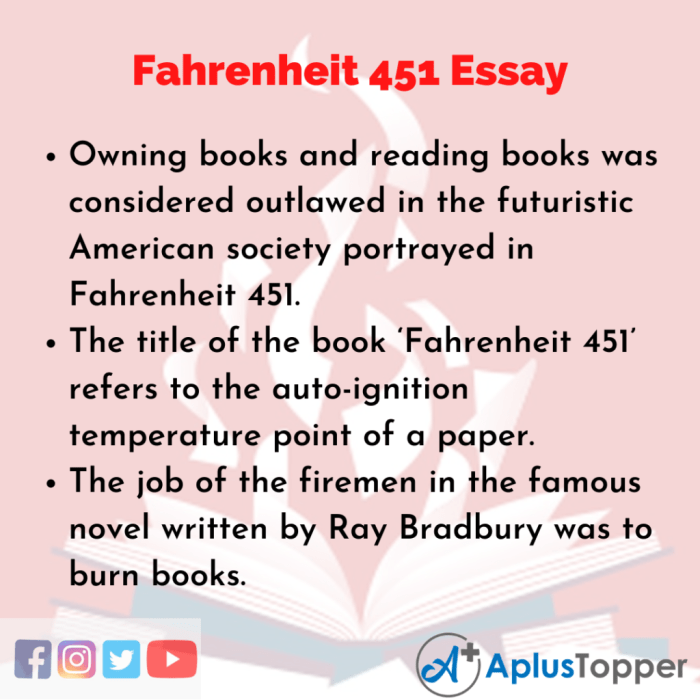Fahrenheit 451 pages 130-158 summary explores the profound themes of censorship, the transformative power of knowledge, and the resilience of the human spirit in the face of oppression. This section of the novel marks a pivotal turning point in Montag’s journey, as he begins to question his role as a fireman and the society he lives in.
As Montag delves deeper into the world of books and ideas, he encounters characters and experiences that challenge his beliefs and ignite a passion for knowledge. The novel delves into the importance of critical thinking, the preservation of human values, and the role of literature in resisting oppression.
Book Burning and Censorship
The book burning scene in pages 130-158 symbolizes the suppression of knowledge and ideas. The firemen, who are tasked with burning books, represent the oppressive society that seeks to control what people can read and think. The burning of books is a physical manifestation of the censorship that pervades the society, preventing citizens from accessing information and critical thinking.
Role of Censorship
- Suppresses knowledge and ideas that challenge the status quo.
- Controls the flow of information and limits access to alternative perspectives.
- Creates a climate of fear and self-censorship, where people are afraid to express dissenting opinions.
Montag’s Transformation: Fahrenheit 451 Pages 130-158 Summary
Montag’s emotional and psychological journey begins when he starts questioning his beliefs. His interactions with Clarisse and Faber challenge his assumptions about the society he lives in. Clarisse’s free spirit and curiosity inspire him to think critically, while Faber provides him with knowledge and support.
Symbolism of the Phoenix
The phoenix, a mythical bird that is reborn from its own ashes, symbolizes Montag’s transformation. As Montag embraces knowledge and critical thinking, he sheds his old self and becomes a new person, committed to preserving knowledge and resisting oppression.
The Underground Railroad and Resistance
The “underground railroad” is a network of people who help individuals escape from the oppressive society. It symbolizes the resistance movement that challenges the oppressive government. The “Book People” play a crucial role in preserving knowledge and providing hope to those who are oppressed.
Significance of the “Book People”
- Preserve knowledge and literature that the government has banned.
- Provide a safe haven for individuals who are seeking knowledge and critical thinking.
- Inspire resistance and hope among the oppressed population.
The Power of Knowledge and Literature

The novel explores the transformative power of knowledge and literature. Reading and critical thinking empower individuals to question authority and challenge oppressive systems. Literature provides a means to preserve human values and experiences.
Importance of Reading and Critical Thinking
- Develops critical thinking skills and allows individuals to question authority.
- Expands knowledge and broadens perspectives.
- Fosters empathy and understanding of diverse viewpoints.
Themes and Symbolism

The major themes explored in pages 130-158 include censorship, knowledge, and resistance. Symbolism plays a significant role in conveying these themes:
Fire
- Represents both destruction (book burning) and rebirth (Montag’s transformation).
Water
- Symbolizes knowledge and purity (Clarisse’s love of nature).
Technology
- Represents the dehumanizing effects of a society that values efficiency over human connection (the “Mechanical Hound”).
Social Commentary and Relevance

The novel reflects the social and political issues of its time, particularly the McCarthy era’s suppression of dissent. It remains relevant today as a cautionary tale about the dangers of censorship and the importance of preserving knowledge.
Contemporary Relevance, Fahrenheit 451 pages 130-158 summary
- Challenges readers to think critically about censorship and the importance of free speech.
- Highlights the power of literature and knowledge in resisting oppression and preserving human values.
- Inspires individuals to question authority and advocate for the preservation of knowledge and freedom of expression.
Clarifying Questions
What is the significance of the book burning scene in pages 130-158?
The book burning scene represents the suppression of knowledge and ideas. It symbolizes the government’s attempt to control and manipulate the population by eliminating access to alternative perspectives and critical thinking.
How does Montag’s interaction with Clarisse influence his transformation?
Clarisse’s curiosity and independent spirit challenge Montag’s assumptions about the world. Her questions and observations spark his desire to explore beyond the narrow confines of his society and to seek out knowledge and meaning.
What is the role of the “Book People” in the novel?
The “Book People” are a group of individuals who have memorized books and preserved them orally. They represent the resilience of the human spirit and the importance of preserving knowledge in the face of adversity.

